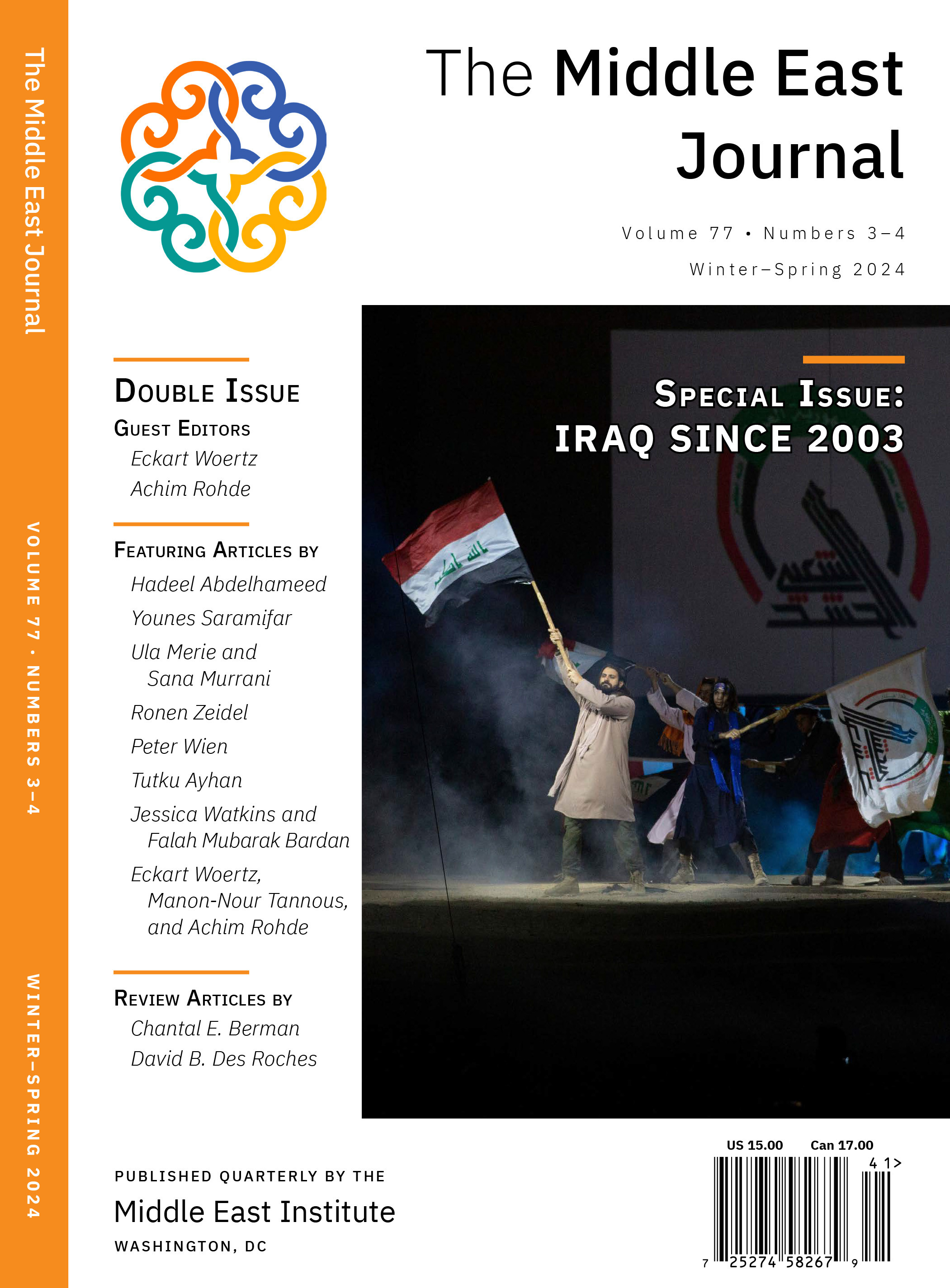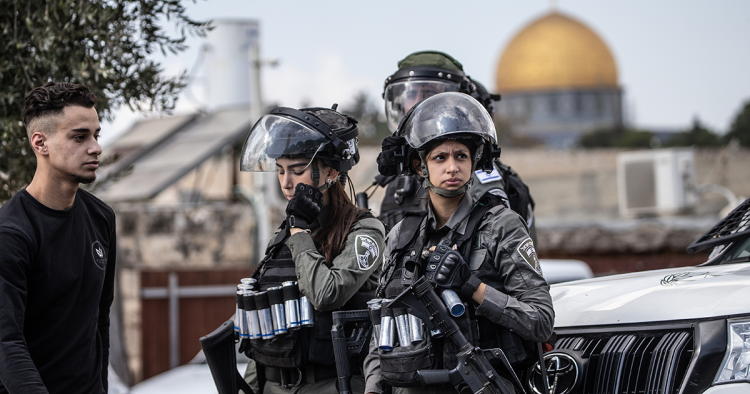Many Palestinian citizens of Israel feel trapped between their Israeli citizenship and day-to-day life in Israel and their Palestinian national identity. Managing this complexity becomes even more challenging in times of escalation and war, as Palestinian citizens of Israel worry for the safety of their family and friends in Gaza and the West Bank. At the same time, Jewish Israelis become even more suspicious of what they perceive as Palestinian citizens’ dual loyalty. During previous wars in Gaza, some Palestinian citizens were disciplined or even fired for social media posts supporting the people of Gaza or criticizing the Israeli military.
In the aftermath of the horrific Hamas terror attack on Oct. 7, and amid the ongoing war in Gaza, the scope and intensity of the current crackdown by the Israeli government and law enforcement are unprecedented. Not only is the government suppressing pro-Palestinian speech, but ordinary citizens are also getting involved, participating in what amounts to a McCarthyist witch hunt. Since Oct. 7, Palestinian citizens have been suspended from work, monitored online, and even attacked by Jewish mobs, all without any accountability by the state. These actions are part of a long-standing policy of limiting Palestinian civil rights, especially when it comes to expressing their national identity.
Israeli governments have long focused on the issue of Palestinian national identity, hoping to prevent Palestinians in the different territories under Israeli control from coming together. Previous coalition governments under Prime Minister Benjamin Netanyahu have taken steps to impose legal limitations on Palestinian citizens’ national expression. Among other things, they prohibited public-sponsored institutions from mentioning the Nakba, or “catastrophe” in Arabic, which is the name given to the mass displacement of over 700,000 Palestinians during the 1948 war. In 2018, under Netanyahu’s leadership, the Knesset passed the Basic Law: Israel as the Nation-State of the Jewish People, which constitutionally enshrines that “the right to exercise national self-determination in the State of Israel is unique to the Jewish people.” In recent years there has also been growing hostility by the police to displaying the Palestinian flag in public spaces.
Limitations and criminalization of expression
The scale and brutality of the Oct. 7 Hamas attack led to further limitations and criminalization of expression of affiliation, concern, or sympathy for Palestinians in Gaza, including the implementation of both official and unofficial policies. Among the official policies was a change by the Justice Ministry to allow for broader criminalization of what they considered pro-Palestinian speech. Previously, as part of the institutional protections for freedom of speech, the State Attorney guidelines required the approval of the State Attorney (or one of his deputies) before the police could initiate an investigation for incitement, publicly identifying with terror acts, or other speech-related felonies. This procedural safeguard was intended to limit police discretion in enforcing such felonies. However, the Justice Ministry revoked the approval requirement two weeks ago and supported expanding prosecution of “inciting speech,” even for a single incident.
Subsequently, Itamar Ben-Gvir, the minister of national security, established an ad hoc incitement task force within the police to focus on investigating and arresting citizens who post incitement speech on social media. Commenting on the arrest of Palestinian actress Maisa Abdel-Hadi, Ben-Gvir proudly stated, “This is a clear message to all those inciting keyboard heroes — the Israel Police will come to each and every one of you.”
Following this policy change, the police arrested dozens of people, primarily Palestinian citizens of Israel, for inciting speech. These numbers are substantially higher than during the previous wars in Gaza. The Association for Civil Rights in Israel reported that the criminalized social media posts ranged from those expressing support for Hamas to ones mourning the loss of life on both sides. For example, the police interrogated a Palestinian citizen of Israel who uploaded a photo of injured children in Gaza next to a message stating, “The eyes are crying over the children of Gaza.”
There is also a legislative campaign to limit civil rights underway, one that would primarily affect Palestinians. Yariv Levin, the minister of justice — who is widely known as the leading proponent of the government’s effort to overhaul the judiciary — introduced new temporary legislation to prohibit the “consumption of terror publications.” The law, which was passed by the Knesset last week, prohibits intentional and systematic consumption of publications by specified terror organizations. Currently, the list of organizations includes only Hamas and ISIS. However, additional entities could be added by the defense minister, with the approval of the Knesset’s Constitution, Law, and Justice Committee, thus creating a potential means of expanding the list. This procedural exception is especially alarming in light of the past designation of Palestinian human rights organizations as terror organizations. Civil rights experts are warning against this legislation, raising concerns that it could lead to the creation of “thought police” that constantly monitor Palestinians’ speech online with a subsequent chilling effect on their freedom of speech.
Police crackdown on protests
Other limitations on Palestinian rights have been implemented unofficially. On Oct. 18, Yaakov Shabtai, the commissioner of the Israeli National Police, said, “Anyone who wants to identify with Gaza is welcome — I’ll put them on buses that will send them there.” Police officers on the ground have subsequently arrested dozens of protesters, Palestinians and left-wing activists, across the country for peacefully protesting in support of a ceasefire or rallying to express their pain over the large number of civilian casualties and widespread displacement in Gaza.
For example, activists from Standing Together, a Jewish-Arab grassroots movement, were arrested after they hung signs saying, “Jews and Arabs, we’ll get through it together.” The police also arrested 11 Palestinian citizens of Israel for prohibited assembly, rioting, and interrupting police officers in performing their duties during a demonstration in Umm al-Fahm.
In addition, backed by a Supreme Court decision allowing the police to ban protests against the war in the Palestinian towns of Sakhnin and Umm al-Fahm, the police arrested the head of the High Follow-Up Committee and several former Palestinian Knesset members for planning to hold a public gathering instead of the planned protests. The police claimed that this gathering amounted to an unlawful disruption of public order, even though these nonviolent protests were intended to take place in the heart of Palestinian cities where support for a ceasefire is high.
Ordinary citizens join in
Even more worrying, there is a growing culture of McCarthyism among ordinary Israelis against Palestinian citizens. Reports by civil rights groups confirm that private discussions in chat groups or the workplace between Jewish and Palestinian coworkers are being used against them. Right-wing Facebook and WhatsApp groups monitor Palestinian workers for pro-Palestinian speech and pressure institutions to sanction or fire workers who publish such speech or are suspected of doing so. Overall, organizations report hundreds of incidents where an employer has dismissed or is in the process of dismissing workers based on statements made in person or online. Many times, the posts in question are misread, irrelevant to the current war, or taken out of context. Dr. Abed Samara, for example, a top cardiologist in a hospital in central Israel, was fired — without a hearing — because of a post he published in June 2022 featuring a green flag, the quote in Arabic “no god but Allah and Muhammad is his prophet,” and an image of a dove holding an olive leaf, a symbol of peace. The hospital received dozens of complaints that this post endorsed Hamas’ attack, and the minister of health ordered the hospital to fire him.
Taken together, these different measures have created a “big brother”-like regime that monitors Palestinian speech online, limits their right to assemble, and incentivizes Jewish citizens to report private discussions with their coworkers. When the war in Gaza eventually ends, these policies could very well become permanent, leading to a reality where Palestinian citizens of Israel have almost no room to express their national identity in the public sphere legitimately.
Eyal Lurie-Pardes is a Visiting Fellow in the Program on Palestine and Palestinian-Israeli Affairs at the Middle East Institute after receiving the competitive University of Pennsylvania Carey Law School LLM Post-Graduate Fellowship.
Photo by Mostafa Alkharouf/Anadolu via Getty Images
The Middle East Institute (MEI) is an independent, non-partisan, non-for-profit, educational organization. It does not engage in advocacy and its scholars’ opinions are their own. MEI welcomes financial donations, but retains sole editorial control over its work and its publications reflect only the authors’ views. For a listing of MEI donors, please click here.












